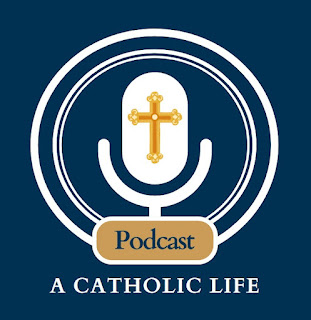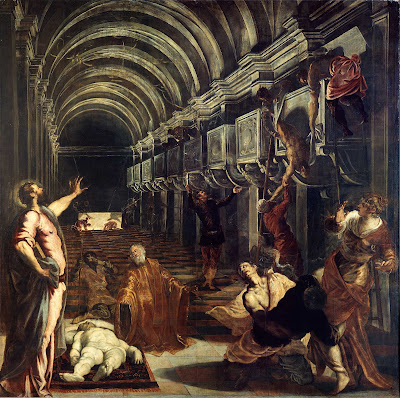- How the 1962 Calendar Is Not Traditional in the First Week of May: Honoring the Forgotten Feasts of St. John, Ss. Philip and James, and the Finding of the Holy Cross.
- Understanding the Forgotten Eastertide Feast of St. Joseph with its Octave, which preceded the Feast of St. Joseph the Worker
- The Spirituality of May in Honor of the Most Blessed Virgin Mary
"In these parts besides those already mentioned, the faithful observed as holy days of obligation St Fabian and St Sebastian (January 20th), St Thomas Aquinas (March 7th), St Mark (April 25th), St Barnabas (June 1), the Visitation of the Blessed Virgin (July 2), St Mary Magdalene (July 22), St Dominic (Aug 4), the Transfiguration (Aug 6), St Francis (Oct 4), St Luke (Oct 18), St Catharine (Nov 25), the Expectation of the Blessed Virgin (Dec 18).
In today’s episode on Good Sheperd Sunday, I address the following:
- Good Shepherd Sunday
- The Feast St. Mark and the Major Rogation Day, including Rogation Day Processions, Prayers of Blessing for Rogation Day, and how come colonies kept St. Mark’s Day as a Holy Day of Obligation.
- Feastdays occuring this last week in April.
I would like to thank Meaning of Catholic for sponsoring this episode. Meaning of Catholic has just launched its online store offering PDF copies of “The Definitive Guide to Catholic Fasting and Abstinence” (in 3 languages), “The Roman Catechism Explained for the Modern World,” and a few other great books to add to your library by authors like Timothy Flanders and Kennedy Hall. Please visit https://meaningofcatholic.com/shop/ to check them out today.
In today’s episode on Low Sunday, I address the following:
- Low Sunday – the Sunday of Many Names and How Sundays Are Given Latin Names in the Liturgy
- Why Penance Is Not Wrong for Pascaltide
- The Almost Election of Cardinal Rampolla
I would like to thank CatechismClass.com for sponsoring this episode. CatechismClass.com, the leader in online Catholic catechism classes, has everything from online K-12 programs, RCIA classes, adult continuing education, marriage preparation, baptism preparation, confirmation prep, quince prep classes, catechist training courses, and much more. Use discount code Easter25 to save 25% off the Easter Season Course.
Can. 1251 Abstinence from meat, or from some other food as determined by the Episcopal Conference, is to be observed on all Fridays, unless a solemnity should fall on a Friday. Abstinence and fasting are to be observed on Ash Wednesday and Good Friday.
Their observance is now similar in format to the Greater Litanies of April 25th, but these three days have a different origin, having been instituted in Gaul in the fifth century as days of fasting, abstinence and abstention from servile work in which all took part in an extensive penitential procession, often barefoot. The procession and litanies only found a place in the Roman liturgy much later (around the beginning of the ninth century) and even then purely as days of rogation – of intercession – rather than as ones of fasting and penance; the latter being deemed incompatible with the nature of Eastertide.
Indeed, this ancient tradition itself is now widely lost in the West. How many Catholics understand what is meant by the greater or lesser litanies, or by the expression “the Rogations” – clergy included?...Dom Guéranger himself lamented the lack of appreciation of the Rogations in his own day: “If we compare the indifference shown by the Catholics of the present age for the Rogation days, with the devotion wherewith our ancestors kept them, we cannot but acknowledge that there has been a great falling off in faith and piety. Knowing, as we do, the great importance attached to these processions by the Church, we cannot help wondering how it is that there are so few among the faithful who assist at them. Our surprise increases when we find persons preferring their own private devotions to these public prayers of the Church, which, to say nothing of the result of good example, merit far greater graces than any exercises of our own choosing.”
The first to give a satisfactory answer to this difficulty, was Canon Moretti, a learned Liturgiologist of last century. In a dissertation of great erudition, he proves that in the 5th, and probably even in the 4th, century, the 25th of April was observed at Rome as a day of great solemnity. The Faithful went, on that day, to the Basilica of St. Peter, in order to celebrate the anniversary of the first entrance of the Prince of the Apostles into Rome, upon which he thus conferred the inalienable privilege of being the Capital of Christendom. It is from that day that we count the twenty-five years, two months and some days that St. Peter reigned as Bishop of Rome. The Sacramentary of St. Leo gives us the Mass of this Solemnity, which afterwards ceased to be kept. St. Gregory, to whom we are mainly indebted for the arrangement of the Roman Liturgy, was anxious to perpetuate the memory of a day, which gave to Rome her grandest glory. He, therefore, ordained that the Church of St. Peter should be the Station of the Great Litany, which was always to be celebrated on that auspicious day. The 25th of April comes so frequently during the Octave of Easter, that it could not be kept as a Feast, properly so called, in honor of St. Peter's entrance into Rome; St. Gregory, therefore, adopted the only means left of commemorating the great event.
A day, then, like this, of reparation to God’s offended majesty, would naturally suggest the necessity of joining some exterior penance to the interior dispositions of contrition which filled the hearts of Christians. Abstinence from flesh meat has always been observed on this day at Rome; and when the Roman Liturgy was established in France by Pepin and Charlemagne, the Great Litany of April 25 was, of course, celebrated, and the abstinence kept by the faithful of that country. A Council of Aix-la-Chapelle, in 836, enjoined the additional obligation of resting from servile work on this day: the same enactment is found in the Capitularia of Charles the Bald. As regards fasting, properly so-called, being contrary to the spirit of Paschal Time, it would seem never to have been observed on this day, at least not generally. Amalarius, who lived in the ninth century, asserts that it was not then practiced even in Rome.
In today’s episode, on Easter Sunday, the most glorious all feastdays, I address the following:
- Customs for Easter Week: Food, Activities, Greetings, and More
- The Agnus Dei Sacramental
- The Easter Duty: What it is and when it may be fulfilled
- There is no incompatibility between abstinence and Pascaltide. Observe Friday Abstinence and even Saturday abstinence in Eastertide.
I would like to thank CatechismClass.com for sponsoring this episode. CatechismClass.com, the leader in online Catholic catechism classes, has everything from online K-12 programs, RCIA classes, adult continuing education, marriage preparation, baptism preparation, confirmation prep, quince prep classes, catechist training courses, and much more. Use discount code Easter25 to save 25% off the Easter Season Course.
- The Strictness of the Holy Week Fast: Passion Fast & Xerophagiae
- Traditions for Holy Week: Indulgences, Forgotten Customs, & Suggestions for a Holy Week
Disclosure of Material Connection: Some of the links on this blog are “affiliate links.” This means if you click on the link and purchase the item, I will receive an affiliate commission. As an Amazon Associate, for instance, I earn a small commission from qualifying purchases made by those who click on the Amazon affiliate links included on this website. I am disclosing this in accordance with the Federal Trade Commission’s 16 CFR, Part 255: “Guides Concerning the Use of Endorsements and Testimonials in Advertising.”
Support A Catholic Life. Your Patronage Helps Keep Us Updated and Online!
Become a Patron! Support Me On Patreon And Get Access to Exclusive Content, Free Catholic Books, Access to Discounts, and Much More!














